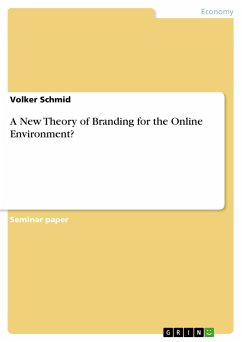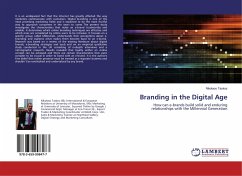Seminar paper from the year 2005 in the subject Business economics - Offline Marketing and Online Marketing, grade: A, University of Teesside (Teesside Business School), language: English, abstract: "According to De Chernatony (2000) a brand is a brand regardless of its environment. Therefore, there is no need for a new theory of branding for the online environment, but merely a different approach to executing the brand's essence".The aim of this paper is to conclude whether brands in a mortal and bricks environment are different from brands in a 'click' environment, and therefore, if a new theory of branding is required. De Chernatony (2000) believes that a "brand is a brand regardless of its environment", which he substantiates by analysing the assumptions about migrating brands to the Internet, and the impact of online communities. In order to test De Chernatony's idea, it is necessary to define and understand a 'brand', its components and functions. For the consumer, a brand provides orientation in the 'product jungle', and facilitates the identification of a specific product among competitive ones. Furthermore, it lowers the purchasing risk, as the customer can trust the functional and emotional quality of the brand (Biel, 2000). Lasty, a brand allows the customer to transfer the brand image to himself. Bugdahl (1998) describes this as a personalisation function or 'snob syndrome', for example, a BMW owner has the physical and emotional experience of "being sporty and having friends" (Herrmann, 2000). Understanding the meaning of a brand, its components and functions, the following section discusses if the essence of a brand changes in an online environment.
Hinweis: Dieser Artikel kann nur an eine deutsche Lieferadresse ausgeliefert werden.
Hinweis: Dieser Artikel kann nur an eine deutsche Lieferadresse ausgeliefert werden.








